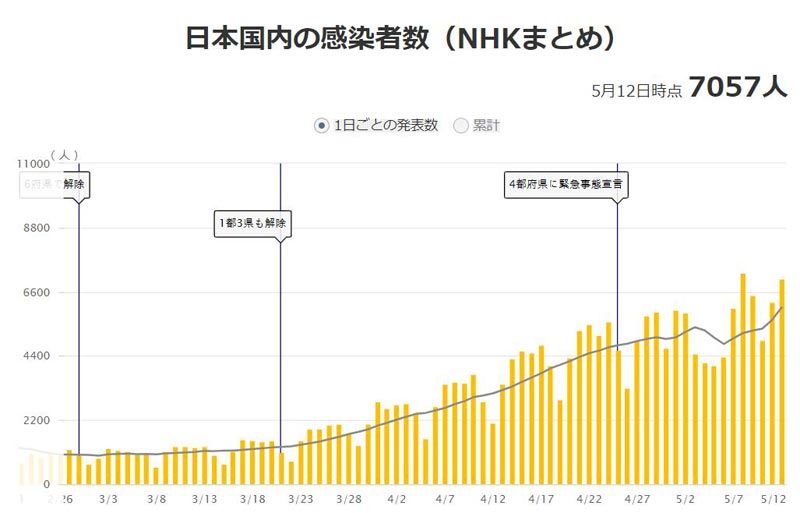 |
| ▲ The changes of daily confirmed cases in Japan. (Source: NHK homepage capture, Yonhap news) |
The number of daily new COVID-19 cases reached over 7,000 in Japan, the country where the Tokyo Summer Olympic Games are scheduled to be hosted this year. According to a survey conducted by the local public broadcaster NHK, there were 7,055 confirmed cases across the country on May 12. Infections are rapidly spreading across the country. In Tokyo, the number of confirmed cases of COVID-19 has continued to surpass 1,000 per day, and the largest number of confirmed cases have been reported in three regions — Fukuoka, Hokkaido, and Fukushima. Nevertheless, the Japanese government is maintaining its intention to push ahead with the Olympics, saying they will hold a safe competition.
However, public opinion is rapidly spreading in Japan that the Tokyo Olympic and Paralympic Games, which start on July 23, should be canceled. On May 9, more than 100 people, including civic groups and officials gathered around the Shinjuku National Stadium and held a protest with the placards, "Protect our lives more than the Olympics." Also, according to a poll conducted by Japan's Yomiuri Shimbun from May 7 to May 9, 59% of the respondents said the Olympics should be canceled, and 23% said it should be held without the spectators. Some politicians and athletes even continue to insist that the Japanese government should reconsider whether to host the Olympics or not. On May 12 and 13, The Campus Journal surveyed students in CWNU on their perceptions of the Tokyo Olympics. As a result, 68% of the respondents said the Olympics should be postponed, and 70.8% said the Olympics should be held without the spectators even if it proceeds as scheduled. Most of the students who supported postponing the Tokyo Olympics pointed out that Japan's spread of COVID-19 is dangerous and its quarantine measures are unreliable.
In fact, the Japanese government has been responding with all-out efforts by declaring a state of emergency since April 25 to allay the spread of COVID-19 and strengthen quarantine measures ahead of the Tokyo Olympics. However, as the situation has not improved despite the all-out responses, a third state of emergency was declared on May 12, and it has been extended for 20 days until the end of this month. As a result, large-scale facilities such as department stores will remain closed, and restaurants’ business hours will be shortened until 8 p.m. However, it seems difficult to contain the spread quickly as mutant viruses emerge as the main source of infection amid slow vaccination in Japan.
People assume that Japan's biggest reason for failing to cancel the Tokyo Olympics is that the International Olympic Committee (IOC), which earns about 70% of its profits from selling Olympics tickets, has not changed its opinion. If the Tokyo Olympic Games are canceled, the IOC will have to pay a considerable amount of money to NBC because it signed a huge contract with them. The Japanese government will also take a big hit. In addition to losing about 17 trillion won, it would also receive huge compensation demands from the IOC. Some fear that Japan's international status will be negatively affected. Even in a survey conducted by The Campus Journal, some of the students who suggested that the Tokyo Olympics should be held as scheduled mentioned Japan's penalty issues and the fact that they should not hinder opportunities for Olympic athletes.
There are still many concerns about canceling the Tokyo Olympics, but there seem to be many difficulties for Japan in deciding to cancel. If the Olympic Games are canceled, Japan cannot abrogate its responsibility because it will take economic losses. Nevertheless, as the whole world is going through one of the worst pandemics in history, the Japanese government must make sure to vaccinate its people faster in order to host the Olympics. Also, a premise should be established to greatly reduce the number of confirmed cases in Japan. Hopefully, the pandemic will be stabilized as soon as possible at this point in time after the third state of emergency comes to an end on May 31.
By Park Jung-hyun,cub-reporter jhgongju0903@gmail.com
<저작권자 © The Campus Journal, 무단 전재 및 재배포 금지>

 Shrinkflation, Consumer Deception
Shrinkflation, Consumer Deception




